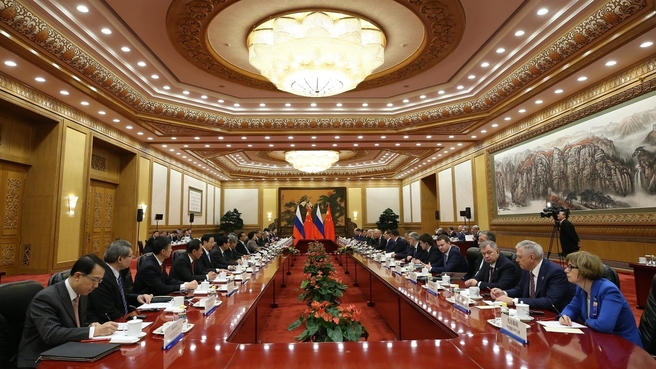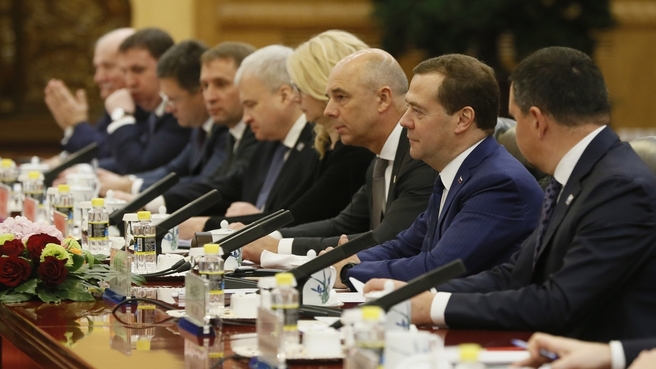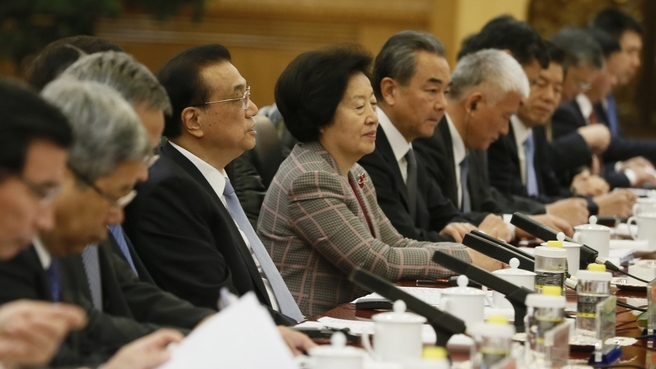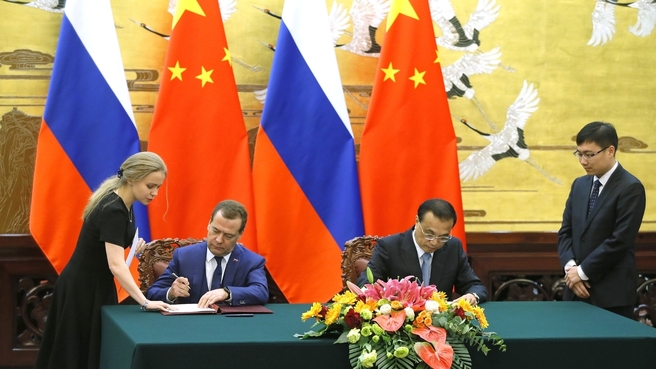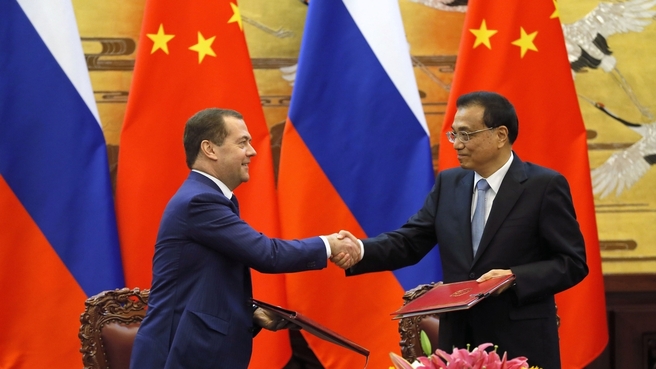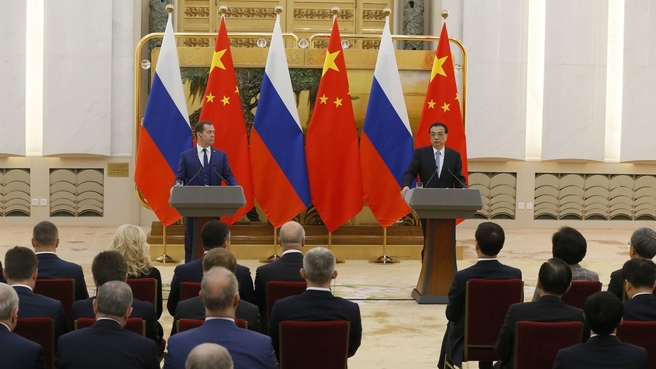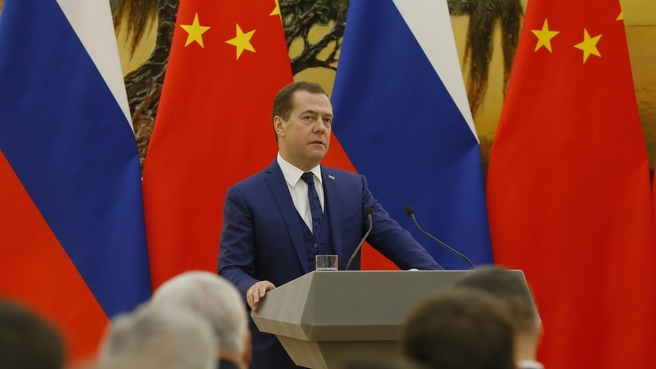Dmitry Medvedev: “The People's Republic of China is today Russia’s biggest foreign trade and investment partner. This year we will reach a level of $100 billion in trade, which seemed unthinkable even 10 or 12 years ago. And now we are talking about a new target: annual mutual trade at $200 billion.”
Dmitry Medvedev’s remarks at the 23rd regular meeting
News conference by Dmitry Medvedev and Li Keqiang
Dmitry Medvedev’s remarks at the 23rd regular meeting:
Mr Premier of the State
Council of China Li Keqiang,
Colleagues and friends,
23rd regular meeting of Russian and Chinese heads of government
I would like to welcome you to the 23rd meeting of the heads of Russian and Chinese governments. This format has proved to be very effective. It continues to improve, allowing us to discuss a wide range of issues. As you have said correctly, it is our first meeting since the formation of new governments, which has allowed our new colleagues to meet and to establish firm ties.
The co-chairs of our commissions will report on their performance this year. The results are good. Our trade has been growing, and we will likely reach a level of $100 billion in trade for the first time in the history of Russian-Chinese relations. But as you have said correctly, this is not the end of the road, and it is clearly not a result we must strive for as our final target. We can seriously increase our trade, and we have set this goal. We are in a position to speak about at least doubling our trade.
China remains the largest trade partner for Russia. We consider this a decisive factor in the further development of our relations. The results of our trade and investment cooperation are very good, which is especially important in light of the problems our economies have encountered because of some countries’ unfriendly actions, the protectionist decisions taken recently by some countries and attempts to undermine the system of international trade. We must join forces to preserve international regulation in this sphere and, better still, to streamline and improve it.
Our agencies will be working together towards this end. We talked about this at the International Import Expo held in Shanghai. Our colleagues will now report on each of these spheres.
Documents signed
following the 23rd regular meeting of the prime ministers of Russia
and China:
- Joint Communique on the results of the 23rd regular meeting of the prime ministers of Russia and China
- Protocol of the 19th meeting of the Russian-Chinese Commission for Humanitarian Cooperation
- Development plan for agriculture in the Russian Far East and Baikal Region and Northeast China
- Memorandum of Understanding on cooperation on trade in services between the Ministry of Economic Development of the Russian Federation and the Ministry of Commerce of the People’s Republic of China
- Memorandum of Understanding between the Federal Customs Service of Russia and the General Administration of Customs of China on streamlining the procedure for customs operations (customs clearance) and customs control of goods moved within the framework of international electronic commerce
- Agreement between the Government of the Russian Federation and the Government of the People’s Republic of China on cooperation in the peaceful use of the GLONASS Global Navigation Satellite System and the BeiDou Navigation Satellite System
- Protocol between the Federal Service for Veterinary and Phytosanitary Surveillance of the Russian Federation and the General Administration of Customs of China on the veterinary and sanitary requirements for mutual deliveries of dairy products
- Protocol between the Federal Service for Veterinary and Phytosanitary Surveillance of the Russian Federation and the General Administration of Customs of China on inspection, quarantine and veterinary-sanitary control of mutual deliveries of refrigerated poultry meat
- Agreement between the Roscosmos State Space Corporation and the China National Space Administration on cooperation in monitoring space debris and the use of collected data
Retrospective
-
22nd regular meeting of Russian and Chinese heads of government
-
The 21st regular meeting of Russian and Chinese heads of government
-
The 20th regular meeting between the heads of the Russian and Chinese governments
-
Russian and Chinese Prime Ministers hold 19th Regular Meeting
-
Eighteenth regular meeting between the heads of the Russian and Chinese governments
- Protocol of the 22nd meeting of the Joint Commission for Regular Meetings of Heads of Government of China and Russia
- Protocol of the 5th meeting of the Intergovernmental Russian-Chinese Commission on Investment Cooperation
- Protocol of the 15th meeting of the Intergovernmental Russian-Chinese Commission on energy cooperation
- Protocol of the 2nd meeting of the Intergovernmental Russian-Chinese Commission on cooperation and development of the Russian Far East and Baikal Region and Northeast China
Press statement by Dmitry Medvedev and Li Keqiang
Excerpts from the transcript:
Li Keqiang (via interpreter): Prime Minister Dmitry Medvedev and I have just held the 23rd regular meeting of the Russian and Chinese heads of government. This is the first such meeting after the change in composition of our governments, and it has great importance for continuity. We exchanged views on matters of mutual interest regarding our practical cooperation, as well as international and regional developments. We identified further cooperation priorities. We heard reports from co-chairs of the five intergovernmental commissions and oversaw the signing of a number of important documents. Our regular meeting was productive and effective, and both China and Russia have long supported the healthy development of bilateral relations. This was the 23rd meeting of its kind. For the last 22 years, we have held these meetings without interruption. This demonstrates the stability of relations between these two big neighbours, China and Russia. This is a benefit not only to our countries, but the whole world.
Our relations are developing at a high enough level – a level that attests to the comprehensive and multifaceted nature of our cooperation. But, of course, while such a high level is unprecedented, it is not the limit for us. On the contrary, it means we have room to continue making progress. In the course of our discussions, we agreed that we have huge untapped potential. China and Russia, as two large countries, complement each other. This year we may reach $100 billion in bilateral trade. But even that is not too high for us, for China and Russia. It allows us to further unlock our potential to take our trade and cooperation and bilateral investments to a qualitatively new level.
<…>
Dmitry Medvedev: Let me begin by thanking the Premier of the PRC State Council and all our Chinese friends for their hospitality and fine organisation of our work over the past few days.
Visit
-
Dmitry Medvedev’s meeting with Prime Minister of Pakistan Imran Khan
-
Dmitry Medvedev’s meeting with President of the BRICS New Development Bank Kundapur Vaman Kamath
-
Dmitry Medvedev’s meeting with President of China Xi Jinping
-
Meeting with Prime Minister of the People’s Republic of China Li Keqiang
-
Dmitry Medvedev lays a wreath at the Monument to the People's Heroes in Beijing
We began by participating in the first Chinese International Import Expo, which is underway in Shanghai. This is a great event and we are happy that we have attended it. Russian companies are taking part in this exhibition. Roundtable discussions were held and a productive exchange of views took place, including on the topic that my colleague has just broached. It concerns the existing international trade regulation regimes, preserving the World Trade Organisation’s rules, reforming the WTO, and the unacceptability of violations committed by certain countries that introduce unjustified trade barriers, sanctions or preferential regimes in cases where this is not allowed by law. Here our approaches are the same. As it was rightly said, we believe that everything that has been done in this sphere should facilitate global trade and global investment exchanges rather than be confined to individual countries or regions, because this hampers development as a whole.
Today, we had a packed programme. Mr Li Keqiang and I held talks in a restricted format. The 23rd meeting of the heads of government with the participation of the delegations has just ended. A number of interagency and intergovernmental agreements have been signed. All of this demonstrates the effectiveness of the format that is being used for the 23rd time.
What can I say about the results?
Russian-Chinese relations are currently at the upturn, largely owing to the unique system of these contacts and an active work done by our colleagues, who have been working on it practically for the whole of this year. As a result, the People’s Republic of China is today Russia’s biggest foreign trade and investment partner.
Bilateral trade is growing fast. This year we will reach a level of $100 billion in trade, which seemed unthinkable even 10 or 12 years ago. And now we are talking about a new target: annual mutual trade at $200 billion. I think this is not beyond our countries’ capability if we focus on advancing cooperation in the areas agreed.
We have agreed on a number of additional steps, such as supporting small businesses, developing e-commerce, and improving the payments system. We will certainly continue working on removing barriers in various fields, and not only in the bilateral format. Obviously, a very important area is what we call the alignment of two projects – the Eurasian Economic Union and the Belt and Road project. As a reminder, this year, the Eurasian Economic Union and China signed an agreement on trade and economic cooperation.
We are implementing a series of investment projects in energy, oil, gas, oil refining, high technologies, including manned space exploration, satellite navigation systems, innovative materials, and IT, including such an important area as the creation of artificial intelligence. We agreed to pay more attention to oil and oil refining, including new projects, and to aspects of developing the Russian Far East, including timber processing.
There are good prospects in agriculture. We have increased the exports of Russian products to China. Our Chinese partners are moving in the same direction. Of course, we are interested in implementing new projects, including the export of Russian soybeans to China and some other projects, also keeping in mind the need to develop our transport and logistics capabilities.
Humanitarian cooperation is also evolving. We have traditionally held cross year projects that symbolised friendship between our two countries. Recently we have gained tremendous experience here. We are currently on Years of Interregional Cooperation. They will obviously have great success and produce the best results in economic and humanitarian cooperation.
We are developing education projects and projects in the cultural sphere. Suffice it to say that 30,000 Chinese students are now studying in our country, and about 18,000 Russian students are enrolled in Chinese universities. It is obvious that in the near future at least 100,000 people will participate in student exchange programmes. This is a good figure and an investment in the future that cannot be ignored.
Once again, I would like to thank Premier Li Keqiang and all our Chinese friends for hosting this meeting, and invite them to the Russian Federation to hold the 24th regular meeting planned for next autumn.
